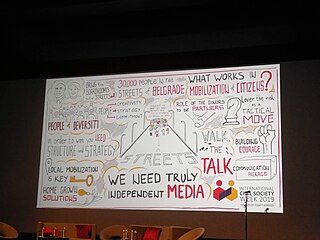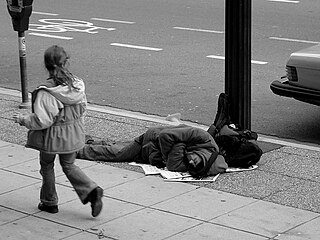Related Research Articles

Civil society can be understood as the "third sector" of society, distinct from government and business, and including the family and the private sphere. By other authors, civil society is used in the sense of 1) the aggregate of non-governmental organizations and institutions that advance the interests and will of citizens or 2) individuals and organizations in a society which are independent of the government.
Cost–benefit analysis (CBA), sometimes also called benefit–cost analysis, is a systematic approach to estimating the strengths and weaknesses of alternatives. It is used to determine options which provide the best approach to achieving benefits while preserving savings in, for example, transactions, activities, and functional business requirements. A CBA may be used to compare completed or potential courses of action, and to estimate or evaluate the value against the cost of a decision, project, or policy. It is commonly used to evaluate business or policy decisions, commercial transactions, and project investments. For example, the U.S. Securities and Exchange Commission must conduct cost-benefit analyses before instituting regulations or deregulations.
The term "minority group" has different usages, depending on the context. According to its common usage, the term minority group can simply be understood in terms of demographic sizes within a population: i.e. a group in society with the least number of individuals, or less than half, is a "minority". Usually a minority group is disempowered relative to the majority, and that characteristic lends itself to different applications of the term minority.
Legal aid is the provision of assistance to people who are unable to afford legal representation and access to the court system. Legal aid is regarded as central in providing access to justice by ensuring equality before the law, the right to counsel and the right to a fair trial. This article describes the development of legal aid and its principles, primarily as known in Europe, the Commonwealth of Nations and in the United States.

In the United States, the number of homeless people on a given night in January 2023 was more than 650,000 according to the Department of Housing and Urban Development. Homelessness has increased in recent years, in large part due to an increasingly severe housing shortage and rising home prices in the United States.
Critical race theory (CRT) is an interdisciplinary academic field focused on the relationships between social conceptions of race and ethnicity, social and political laws, and media. CRT also considers racism to be systemic in various laws and rules, and not only based on individuals' prejudices. The word critical in the name is an academic reference to critical theory rather than criticizing or blaming individuals.

The Personal Responsibility and Work Opportunity Reconciliation Act of 1996 (PRWORA) is a United States federal law passed by the 104th United States Congress and signed into law by President Bill Clinton. The bill implemented major changes to U.S. social welfare policy, replacing the Aid to Families with Dependent Children (AFDC) program with the Temporary Assistance for Needy Families (TANF) program.
Social exclusion or social marginalisation is the social disadvantage and relegation to the fringe of society. It is a term that has been used widely in Europe and was first used in France in the late 20th century. It is used across disciplines including education, sociology, psychology, politics and economics.

In the United States, affirmative action consists of government-mandated, government-approved, and voluntary private programs granting special consideration to groups considered or classified as historically excluded, specifically racial minorities and women. These programs tend to focus on access to education and employment in order to redress the disadvantages associated with past and present discrimination. Another goal of affirmative action policies is to ensure that public institutions, such as universities, hospitals, and police forces, are more representative of the populations they serve.

Philip Geoffrey Alston is an Australian international law scholar and human rights practitioner. He is John Norton Pomeroy Professor of Law at New York University School of Law, and co-chair of the law school's Center for Human Rights and Global Justice. In human rights law, Alston has held a range of senior UN appointments for over two decades, including United Nations Special Rapporteur on extrajudicial, summary or arbitrary executions, a position he held from August 2004 to July 2010, and UN Special Rapporteur on extreme poverty and human rights from 2014-2020.

Anti-homelessness legislation can take two forms: legislation that aims to help and re-house homeless people; and legislation that is intended to send homeless people to homeless shelters compulsorily, or to criminalize homelessness and begging.

The right to housing is the economic, social and cultural right to adequate housing and shelter. It is recognized in some national constitutions and in the Universal Declaration of Human Rights and International Covenant on Economic, Social and Cultural Rights. The right to housing is regarded as a freestanding right in the International human rights law which was clearly in the 1991 General Comment on Adequate Housing by the UN Committee on Economic, Social and Cultural Rights. The aspect of the right to housing under ICESCR include: availability of services, infrastructure, material and facilities; legal security of tenure; habitability; accessibility; affordability; location and cultural adequacy.

Homelessness in Israel is a phenomenon that mostly developed after the mid-1980s.
Gunnar Dybwad (1909–2001) was an American professor and advocate for the rights of people with disabilities, particularly developmental disabilities. He is best known for his support for the social model of disability, reframing disability accommodations as a matter of civil rights, not medical treatment. The American Association on Intellectual and Developmental Disabilities gives out the Dybwad Humanitarian Award annually in his honor.

Activism consists of efforts to promote, impede, direct or intervene in social, political, economic or environmental reform with the desire to make changes in society toward a perceived greater good. Forms of activism range from mandate building in a community, petitioning elected officials, running or contributing to a political campaign, preferential patronage of businesses, and demonstrative forms of activism like rallies, street marches, strikes, sit-ins, or hunger strikes.

The San Francisco Bay Area comprises nine northern California counties and contains four of the ten most expensive counties in the United States. Strong economic growth has created hundreds of thousands of new jobs, but coupled with severe restrictions on building new housing units, it has resulted in an extreme housing shortage which has driven rents to extremely high levels. The Sacramento Bee notes that large cities like San Francisco and Los Angeles both attribute their recent increases in homeless people to the housing shortage, with the result that homelessness in California overall has increased by 15% from 2015 to 2017. In September 2019, the Council of Economic Advisers released a report in which they stated that deregulation of the housing markets would reduce homelessness in some of the most constrained markets by estimates of 54% in San Francisco, 40 percent in Los Angeles, and 38 percent in San Diego, because rents would fall by 55 percent, 41 percent, and 39 percent respectively. In San Francisco, a minimum wage worker would have to work approximately 4.7 full-time jobs to be able to spend less than 30% of their income on renting a two-bedroom apartment.

Strategic litigation, also known as impact litigation, is the practice of bringing lawsuits intended to effect societal change. Impact litigation cases may be class action lawsuits or individual claims with broader significance, and may rely on statutory law arguments or on constitutional claims. Such litigation has been widely and successfully used to influence public policy, especially by left-leaning groups, and often attracts significant media attention. One prominent instance of this practice is Brown v. Board of Education.

Homelessness in South Africa dates back to the apartheid period. Increasing unemployment, lack of affordable housing, social disintegration, and social and economic policies have all been identified as contributing factors to the issue. Some scholars argue that solutions to homelessness in South Africa lie more within the private sphere than in the legal and political spheres.
Linda McClain is the Robert B. Kent Professor of Law at Boston University School of Law, and was previously the Rivkin Radler Distinguished Professor of Law at Hofstra Law School. McClain's work focuses on family law, sex equality, and feminist legal theory. McClain has written extensively on topics related to family, gender, and constitutional issues.
Welfare colonialism is a form of colonialism where investments by the colonizer in the native population, ostensibly intended to improve their quality of life, contribute to the dissolution of indigenous institutions thus perpetuating dependency and creating a permanent underclass. Though usage of the term dates from the 1950s, the concept is often associated with anthropologist Robert Paine, who expanded and developed it while observing the failed economic integration of the native population in Northern Canada. In welfare colonialism, subjugated peoples typically remain impoverished despite huge sums invested nominally for their welfare while their standard of living declines. The concept has been used to explain the ongoing poverty and low living standards of native populations in many countries, particularly those that that have been subject to settler colonialism.
References
- ↑ Woo, Elaine (July 18, 2008). "Madeleine Stoner - expert on homelessness". The San Francisco Chronicle. Retrieved July 13, 2019.
- ↑ "Madeleine R. Stoner". The Los Angeles Times. July 16, 2006. Retrieved July 13, 2019– via Legacy.com.
- ↑ North-Hager, Eddie. "In Memoriam: Madeleine Stoner". Suzanne Dworak-Peck School of Social Work. University of Southern California. Retrieved July 13, 2019.
- ↑ Mohan, Brij (January 1992). "Reviewed Work: Inventing a Non-Homeless Future: A Public Policy Agenda for Preventing Homelessness by Madeleine R. Stoner". Social Work. 37 (1): 94–95. JSTOR 23716550.
- ↑ Colson, Paul (March 1997). "Reviewed Work: The Civil Rights of Homeless People: Law, Social Policy, and Social Work Practice by Madeleine R. Stoner". Social Service Review. 71 (1): 160–162. doi:10.1086/604241. JSTOR 30012617.